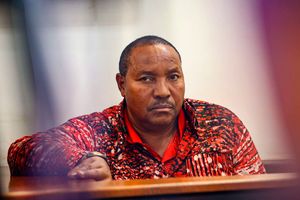Premium
Farmaajo ‘relies’ on foreign-trained forces to target opponents

President Uhuru Kenyatta holds a joint press conference with his Somalia counterpart Mohamed Farmaajo at a Nairobi hotel.
What you need to know:
- Political leaders say they have been harassed and supporters restricted from moving freely.
- Council of the Union of Presidential Candidates have condemned the misuse of the police.
Somalia’s President Mohamed Farmaajo is facing accusations of misusing foreign-trained police units to harass top presidential contenders, days after he cut ties with Kenya over interference in internal matters.
More than a dozen presidential candidates said Turkish-trained police units known as Haram’ad descended on the Bulo Hubey area of Mogadishu, ostensibly to take charge of security.
But the political leaders say they have been harassed and supporters restricted from moving freely.
Known as the Council of the Union of Presidential Candidates, the 14 leaders - including former Presidents, ministers and an ex-Premier - condemned the misuse of the police, saying the government was inciting the public to retaliate.
“We, once again, warn President Farmaajo from using government forces to suppress the people and provoke politicians, “the Council chaired by former President Sheikh Sharif Ahmed said in a statement.
“The Council underscores that President Farmaajo will be responsible for the provocations and incitement to violence that threatens the nation’s security in general and that of the leaders of the presidential candidates’ union in particular.”
Officials of the Somalia Federal Government did not immediately explain the sudden deployment of troops specially those trained by the Turkish government.
On Thursday, the 14 warned Ankara not to take sides in the ongoing political contest.
The candidates have been vocal in opposing polling officials appointed to serve on various electoral commissions.
Daily protests
On Tuesday, they launched a series of daily protests in the streets of Mogadishu to force the government to reconsider the list of appointees, which the 14 candidates claim includes spy agents and cronies of the President.
And while the Federal government has dismissed the demands, the 14, who include Mr Ahmed, former Presidents Hassan Sheikh Mohamoud and ex-Premier Hassan Khaire, have proven a hard nut to crack.
Some politicians argued that deployment of troops on political assignment was meant to escalate the dispute.
Abdifatah Ismail Tahir, a Somali MP and Chair of Committee for Ports, Airports, Transport and Energy, said the President, having failed to unify stakeholders on the electoral calendar, was looking for ways to delay the polls.
“Today’s provocative cordon on residences of presidential candidates is a calculated move aimed at sparking mass violence before Feb 8,” he said referring to the intended presidential election date.
“I urge aspirants not to lift a finger till then, even if slapped in the face.”
On Tuesday, Farmaajo’s government announced it had cut ties with Kenya over “constant interference” in the affairs of the country. Some experts, however, think the motive behind the move is political.
“The power elite in Villa Somalia is playing a dangerous diversionary game, trying to divert attention from a brewing internal electoral crisis by turning Kenya into a boogeyman,” argued Lemmy Nyongesa, a Senior Researcher at the Africa Policy Institute in Nairobi.
“Somalia’s leadership should focus on delivering on the upcoming General Elections and putting its own house in order,” the Institute added in a bulletin, warning that cultural connections between people should determine relations.
Turbulent past
“Kenya and Somalia are inextricably linked. Regrettably, closing the common border between the countries will only hurt innocent citizens of Somalia now living in Kenya as refugees, businesspeople or workers. Villa Somalia should learn from the country’s turbulent past and reconsider handling of relations with key neighbours such as Kenya,” the Institute said.
Kenya has indicated it will not target property owned by any of the estimated 2.5 million Somali nationals in Kenya. Government Spokesman Cyrus Oguna said Nairobi will instead pursue normalisation as soon as possible.
On Thursday, though, claims emerged that Somalia intended to pursue forcible removal of Kenyan forces from the African Union Mission in Somalia, an African Union stablisation force but which is mandated by the UN Security Council until September next year.
Brig-Gen (Rtd) Ahmed Mohamed, a senior Advisor on Defence and Security at the Horn Institute in Nairobi, argued the threats by Farmaajo were only meant to secure his presidential bid.
“Farmaajo is playing to the public gallery,” he told a forum on Kenya-Somalia relations in Nairobi on Thursday. I can foresee that things will be normal after elections.”





